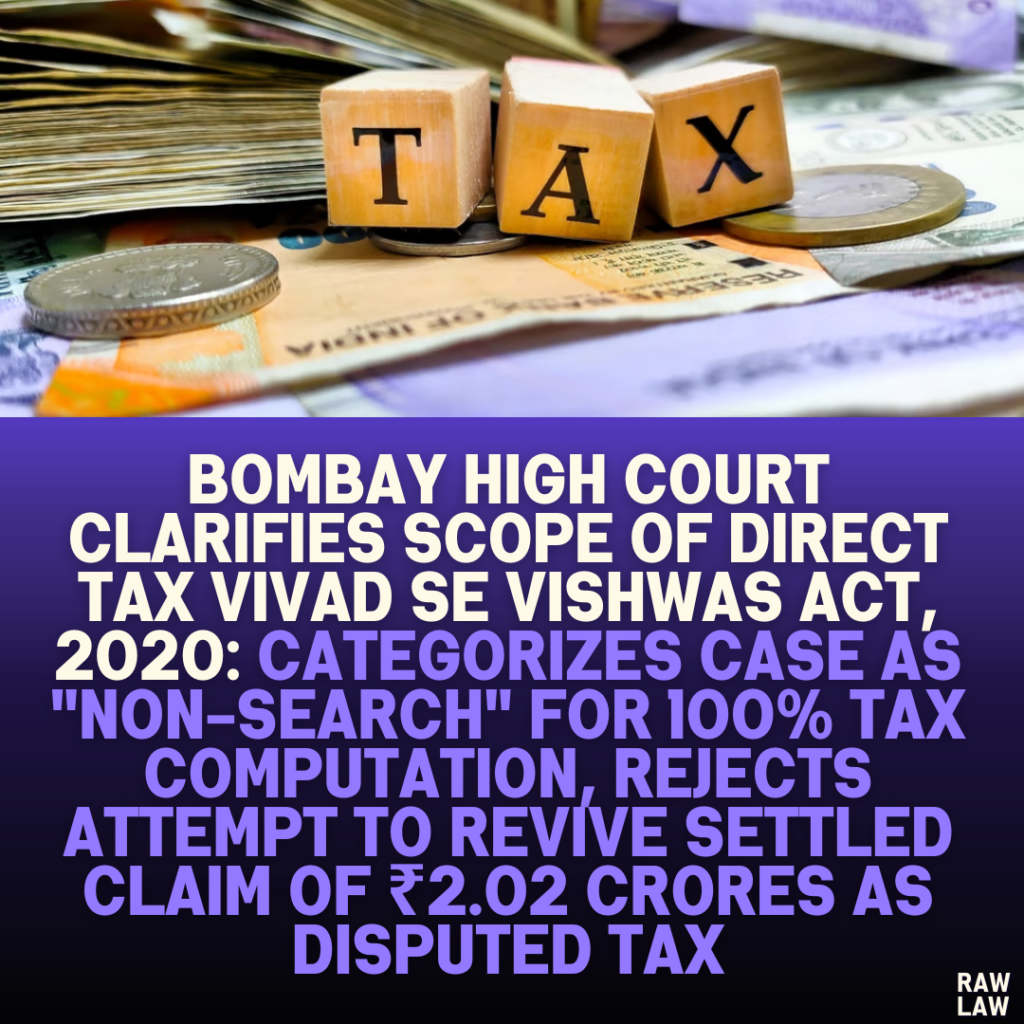Court’s Decision:
The Bombay High Court held that the Petitioner’s case under the Direct Tax Vivad Se Vishwas Act, 2020 (DTVSV Act), was a “non-search case” and directed the Respondents to issue a revised Form-3, determining the payable tax at 100% of the disputed tax. However, the court rejected the Petitioner’s claim to include ₹2,02,50,919 as part of the disputed tax for availing additional benefits under the DTVSV scheme. The court emphasized that the DTVSV Act is meant for settling existing disputes, not reviving settled claims or expanding the scope of disputes post facto.
Detailed Explanation
Facts:
- Background of the Assessment:
- The Petitioner filed a tax return for the assessment year 2014-15, declaring income after claiming Long-Term Capital Gains (LTCG) exemption under Section 10(38) of the Income Tax Act, 1961.
- During the assessment, the Income Tax Officer doubted the genuineness of the LTCG claim based on information from the Investigation Wing.
- Concession of LTCG Addition:
- To avoid prolonged litigation, the Petitioner voluntarily offered ₹2,02,50,919 (LTCG) to be taxed under Section 68 and agreed not to claim the LTCG exemption.
- The Income Tax Officer added this amount to the taxable income and also imposed a penalty under Section 271(1)(c) for concealment of income.
- Appeals Filed:
- The Petitioner appealed against only a minor addition of ₹9,11,037 under Section 69C of the Income Tax Act and the penalty of ₹72,07,774 but did not appeal against the addition of ₹2,02,50,919.
- No challenge was raised regarding the ₹2,02,50,919 addition until after the DTVSV Act came into force.
- Introduction of the DTVSV Act, 2020:
- The DTVSV Act provided a scheme for settling pending tax disputes as of January 31, 2020, with tax computation based on the category of disputes (“search case” or “non-search case”).
- Dispute Under the Scheme:
- The Petitioner’s case was initially treated as a “search case,” requiring tax computation at 125% of the disputed tax. The Petitioner contested this categorization and sought computation at 100%.
- Additionally, the Petitioner attempted to include ₹2,02,50,919 as “disputed tax” to avail benefits under the DTVSV scheme.
Issues:
- Categorization as “Search Case” or “Non-Search Case”:
- Whether the Petitioner’s case should be treated as a “non-search case” for the purpose of computing the payable tax rate under the DTVSV Act.
- Inclusion of ₹2,02,50,919 as Disputed Tax:
- Whether the belated inclusion of ₹2,02,50,919 as disputed tax after January 31, 2020, was permissible under the DTVSV Act.
Petitioner’s Arguments:
- Error in Categorization:
- The Respondents erred in treating the case as a “search case,” leading to a higher computation rate of 125% instead of 100%.
- Inclusion of Additional Grounds:
- The additional grounds filed on December 4, 2020, challenging the addition of ₹2,02,50,919 should be considered under CBDT Circular No. 21 of 2020, which permits consideration of grounds filed before January 31, 2020.
- Justification for Delay:
- The delay in raising the additional grounds was attributed to “transitional issues” and “software glitches.”
Respondents’ Arguments:
- Acknowledgment of Non-Search Case:
- The Respondents conceded that the case was a “non-search case” and agreed to revise the tax computation to 100%.
- Belated Inclusion of ₹2,02,50,919:
- The inclusion of ₹2,02,50,919 as disputed tax was baseless, as the addition had been voluntarily conceded by the Petitioner and no appeal was filed within the stipulated period.
- No Evidence of Technical Issues:
- There was no evidence supporting the claim of transitional issues or software glitches that prevented the Petitioner from raising additional grounds earlier.
Analysis of the Law:
- Definition of Disputed Tax:
- Under Section 2(j) of the DTVSV Act, disputed tax is the tax amount that would be payable if the appeal or writ petition pending as of January 31, 2020, was decided against the taxpayer.
- Applicability of CBDT Circular:
- Circular No. 21 of 2020 clarified that additional grounds filed before January 31, 2020, could be considered. However, the Petitioner’s additional grounds were filed only on December 4, 2020.
- Voluntary Concession of LTCG Addition:
- The Petitioner had voluntarily offered the addition of ₹2,02,50,919 in 2016 and paid taxes without protest, which excluded it from the scope of disputed tax under the DTVSV Act.
Precedent Analysis:
- The court referred to the judgment in Bhupendra Harilal Mehta v. Principal Commissioner of Income Tax, which supported the computation of tax at 100% for non-search cases under the DTVSV Act.
Court’s Reasoning:
- Categorization as Non-Search Case:
- The court accepted the Petitioner’s contention that the case was a “non-search case” and directed the Respondents to issue a revised Form-3.
- Rejection of Additional Grounds:
- The court held that the Petitioner’s belated attempt to include ₹2,02,50,919 as disputed tax contradicted the scheme’s objective and amounted to an artificial revival of a settled dispute.
- No Evidence of Technical Issues:
- The court found no evidence to substantiate the Petitioner’s claims of technical issues or transitional problems.
Conclusion:
- Relief Granted:
- The Respondents were directed to issue a revised Form-3 within 30 days, calculating the tax at 100% for the assessment year 2014-15.
- Relief Denied:
- The claim to include ₹2,02,50,919 as disputed tax under the DTVSV Act was rejected.
Implications:
This decision reaffirms the scope of the DTVSV Act as a mechanism for settling existing disputes and not as a tool for reopening or expanding settled matters. It also clarifies the criteria for determining search versus non-search cases under the Act, ensuring uniformity in tax computation.
